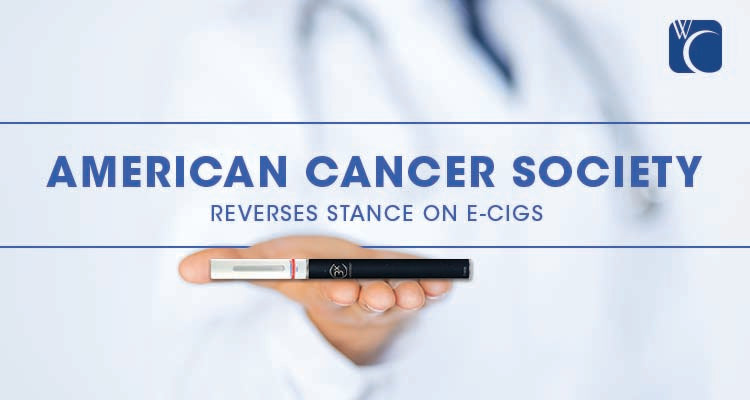The American Cancer Society recently shocked the world by reversing its previously hostile stance toward e-cigarettes. With its new policy position, the ACS joins the growing number of public health organizations that view vaping as a safer alternative to smoking.
The American Cancer Society Endorses Vaping Over Smoking

A new statement on the ACS website claims that “some smokers, despite firm clinician advice, will not attempt to quit smoking cigarettes and will not use FDA approved cessation medications.” Therefore, the statement continues, “these individuals should be encouraged to switch to the least harmful form of tobacco product possible.”
Additionally, the ACS “strongly recommends that every effort be made to prevent the initiation of e-cigarettes by youth.” The group also encourages the FDA to “assess whether e-cigarettes help to reduce tobacco-related morbidity and mortality, and the impact of marketing of e-cigarettes on consumer perceptions and behavior.”
The ACS notes that more data is needed about the long term health effects of vaping. so the group could change its position again in the future. While we wait for more research, we already know that smoking is deadly. Consequently, “switching to the exclusive use of e-cigarettes is preferable to continuing to smoke combustible products,” the ACS policy statement concludes.
Shifting Opinions on Vaping
When e-cigs first became popular, many public health groups were skeptical about the value of vaping. Ironically, the first commercial e-cig was invented by a Chinese pharmacist whose father died of lung cancer due to smoking tobacco. The doctor wanted to create a device that satisfied smokers’ intense cravings without the same health risks as smoking. Today, millions of former smokers across the globe are now vapers.
A major turning point came in 2015 when Public Health England published an evidence-based report concluding that vaping is typically 95 percent safer than smoking tobacco. Shortly thereafter, the British Royal College of Physicians began instructing doctors to recommend vaping to their patients who smoke.
Smoking vs. Vaping

While the organization urges the FDA to regulate e-cigs as tobacco products, which is already starting to happen, the ACS proposes differentiating between the relative harms of various tobacco products. Still, some public health advocates criticized the group’s initial statement for not going far enough in explaining the difference between smoking and vaping.
In response, the ACS released a follow-up statement clarifying that combustible tobacco, not nicotine, is the primary culprit behind smoking related deaths and illnesses. According to the American Cancer Society, the process of burning tobacco “yields an estimated 7000 chemicals, including at least 70 carcinogens.”
Nicotine, on the other hand, has demonstrated therapeutic properties. Studies suggest that nicotine may be useful for treating neurological disorders like Alzheimer’s and Parkinson’s diseases. Although addictive, nicotine has not been linked to cancer. Given that e-cigs do not burn tobacco, the second statement reiterates that “there is sufficient information to allow the ACS to act now with a clear focus on the primary goal of ending deadly combustible tobacco use.”
The Evolving Debate Over Vaping

The American Cancer Society’s announcement is a major victory for vapers and tobacco harm reduction advocates. Nonetheless, many other public health agencies around the world have continued to vilify vaping as a gateway to smoking despite evidence to the contrary. Sadly, while scientific studies have repeatedly found that vaping is less harmful than smoking, public perception of e-cigs has actually gotten worse thanks to misleading media reports and pro-tobacco propaganda.
The ACS points out that many adults erroneously believe that vaping is “as harmful as combustible tobacco products, and the level of public understanding has deteriorated over time.” The statement points to polls indicating that the number of adults who believe that the health risks of vaping and smoking are “about the same” tripled from 2012 to 2015. “Thus,” the ACS asserts, “public misunderstanding underscores the urgent need for consumer education about the absolute and relative risks posed by different tobacco products and to reinvigorate smokers’ understanding of the importance of quitting combustible tobacco.”








